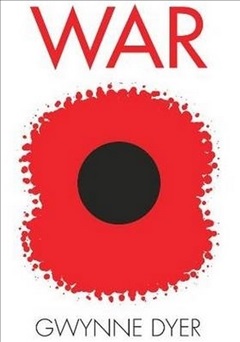This modern classic by international journalist and military historian Gwynne Dyer is widely acknowledged as one of the most compelling analyses of the history and psychology of armed conflict throughout the ages. Why do humans fight wars? Is it even possible to tame the impulse? Is this “lethal custom” innate, or culturally determined? How might we change? War is essential reading on the way to considering these eternal questions.

War was first published in 1985 following a 1983 seven-part Canadian television miniseries produced by Dyer. A second edition, titled War: The Lethal Custom, was published in 2006. This book is essentially a third edition which has been revised and updated from the second.
Dyer traces the growth of organised warfare from the earliest days of humankind, as well as the psychology of individual soldiers, to the workings of whole armies. Using analogies with other animal species, he seeks insights into the social and biological aspects of organised violence. He argues that war as an act of mass violence has remained unchanged. The only real change has been technological. He suggests that the international system, whereby each polity is responsible for its own defence, encourages war to settle disputes about status and influence.
Reflecting the age when it was first written, Dyer addresses the topic of nuclear and thermonuclear war in some detail and argues that the use of these weapon systems would threaten the existence of life on earth. The 2006 edition reflected on the expansion of the ‘nuclear weapon club’ to include India and Pakistan in the nineties. Dyer queries whether they will come to adopt the logic of Mutually Assured Destruction that came to define the nuclear weapon relationship between the United States and the Union of Soviet Socialist Republics. At a time when North Korea has recently joined the nuclear weapon club, and Iran continues to work towards that goal, it is certainly worth reconsidering the strategic calculus of nuclear weapons. He makes the point that even though the Cold War ended, the United States and Russia still maintain very large nuclear arsenals and the number of weapons around the world is slowly growing.
This edition of War comes 15 years after 9/11 and unsurprisingly includes a chapter titled ‘Guerillas and Terrorism’, but focusing on war in the greater Middle East since 9/11. His analysis of the motives and fighting is insightful, but I was surprised he did not address the Sunni/Shia divide/contest which has fuelled a good amount of the killing. Dyer concludes that the al-Qaeda/Islamic State groups are merely revolutionary movements and while they have enjoyed some successes they will ultimately be defeated. He implores the reader to maintain perspective on the threat and consequences of nuclear war versus international terrorism.
The other area that Dyer is silent on is women serving in the military. This is curious as it represents a recent and significant break from the historical norm and the psychology and social science behind this shift is worth exploring.
While there can never be one definitive volume on a topic as vast and varied as ‘war’, Dyer has done a very good job of writing a book about the custom of war, placing it within the historical and cultural contexts where it resides. Writing in clear, intelligent and eminently accessible prose, Dyer does not submit to resignation or false optimism; but it is clear that Dyer is a pacifist and hopes that somehow humanity can figure out a way to eradicate war.
War includes several black-and-white images, footnotes for each chapter and an index, but no bibliography. Annoyingly, there are some passages concerning geo-political developments that have not been updated since the second edition that are factually incorrect. And curiously, the Acknowledgements are from the second edition. Progressively revising and updating a book over 30 years is clearly a challenging process.
This is a large book, brimming with critical thinking and analysis, not all of which will be absorbed on first reading. But it is well worth the effort, being one of the best books on the subject that is currently available – and immeasurably more relevant than Clausewitz or Sun Tzu. Not only those readers and researchers of military topics should read War – historians, sociologists, and those who wonder why society is the way it is today, should take the time to read what Dyer has to say.
Contact Marcus Fielding about this article.






